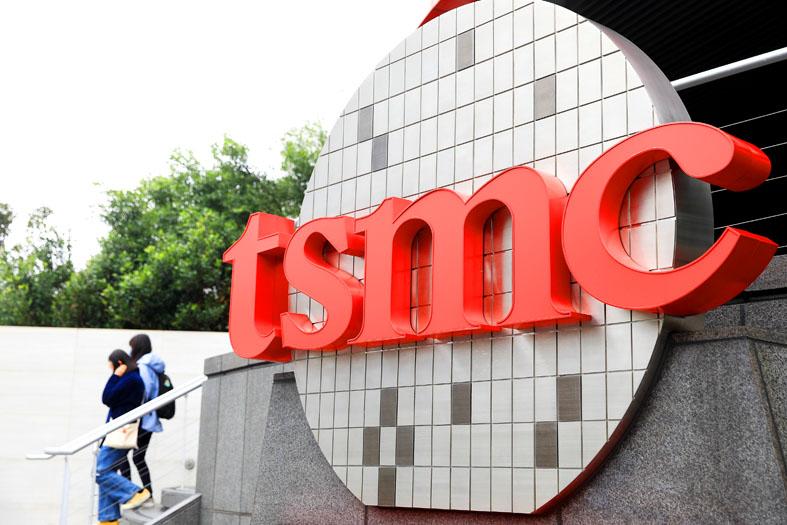Taiwan Semiconductor Manufacturing Co’s (TSMC, 台積電) revenue rose to a record in the first quarter on demand for chips used in smartphones, computers and vehicles, while a prolonged shortage helped to boost prices.
Revenue jumped 36 percent to NT$491.1 billion (US$17 billion) in the first quarter, the company said in a statement yesterday.
Analysts estimated NT$469.4 billion on average.

Photo: Cheng I-hwa, Bloomberg
Demand for mobile phones, smart televisions and other gadgets from makers such as Apple Inc and Samsung Electronics Co remains robust even as consumers in major markets in Europe and the US exit COVID-19 pandemic-era lockdowns and work-from-home arrangements.
Meanwhile, a chip shortage is yet to ease — the wait times for semiconductor delivery grew again last month due to China’s COVID-19 lockdowns and an earthquake in Japan that hit production, research by Susquehanna Financial Group said.
TSMC has kept production running in China, even as many other factories suspended operations to cope with the local pandemic policy. The chip assembler said at the end of last month that it would rearrange production priorities to deal with a shift in demand caused by COVID-19 restrictions in Shanghai and Shenzhen.
TSMC was not planning to revise down its sales and capital spending forecasts for this year, chairman Mark Liu (劉德音) said at the time.
Shares of TSMC have lost about 8 percent this year, hurt by a broader decline in global technology stocks and China’s lockdowns, which have weighed on consumer demand and affected supply chains. The stock advanced 0.2 percent yesterday ahead of the company’s report.
Separately, contract chipmaker United Microelectronics Corp (UMC, 聯電) yesterday said revenue soared 34.66 percent last quarter to a new record high of NT$63.42 billion, compared with NT$47.1 billion in the same period last year.
On a quarterly basis, revenue expanded 7.31 percent, slightly better than the chipmaker’s expectations.
UMC expected revenue to rise about 5 percent sequentially, primarily due to price hikes, citing strong chip demand from makers of vehicles, Internet-of-Things devices and display drivers.
UMC forecast that revenue growth this year would outstrip the foundry’s sector projected growth of 20 percent in a best-case scenario.
Additional reporting by Lisa Wang

South Korea’s equity benchmark yesterday crossed a new milestone just a month after surpassing the once-unthinkable 5,000 mark as surging global memory demand powers the country’s biggest chipmakers. The KOSPI advanced as much as 2.6 percent to a record 6,123, with Samsung Electronics Co and SK Hynix Inc each gaining more than 2 percent. With the benchmark now up 45 percent this year, South Korea’s stock market capitalization has also moved past France’s, following last month’s overtaking of Germany’s. Long overlooked by foreign funds, despite being undervalued, South Korean stocks have now emerged as clear winners in the global market. The so-called “artificial intelligence

NEW IDENTITY: Known for its software, India has expanded into hardware, with its semiconductor industry growing from US$38bn in 2023 to US$45bn to US$50bn India on Saturday inaugurated its first semiconductor assembly and test facility, a milestone in the government’s push to reduce dependence on foreign chipmakers and stake a claim in a sector dominated by China. Indian Prime Minister Narendra Modi opened US firm Micron Technology Inc’s semiconductor assembly, test and packaging unit in his home state of Gujarat, hailing the “dawn of a new era” for India’s technology ambitions. “When young Indians look back in the future, they will see this decade as the turning point in our tech future,” Modi told the event, which was broadcast on his YouTube channel. The plant would convert

‘SEISMIC SHIFT’: The researcher forecast there would be about 1.1 billion mobile shipments this year, down from 1.26 billion the prior year and erasing years of gains The global smartphone market is expected to contract 12.9 percent this year due to the unprecedented memorychip shortage, marking “a crisis like no other,” researcher International Data Corp (IDC) said. The new forecast, a dramatic revision down from earlier estimates, gives the latest accounting of the ongoing memory crunch that is affecting every corner of the electronics industry. The demand for advanced memory to power artificial intelligence (AI) tasks has drained global supply until well into next year and jeopardizes the business model of many smartphone makers. IDC forecast about 1.1 billion mobile shipments this year, down from 1.26 billion the prior

People stand in a Pokemon store in Tokyo on Thursday. One of the world highest-grossing franchises is celebrated its 30th anniversary yesterday.